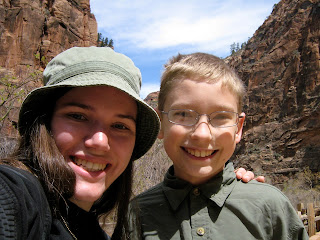 |
| The hostel kitchen in Florida City, where I spent a lot of time. I later couchsurfed at Amey's house in Nashville. |
My idea of “vacation” is largely shaped by the trips my family used to take to see my grandparents. Although the trip there and back consisted of hotel visits, swimming pools, camping and beach walks, a large chunk of it was spent at my grandparents’ house, where we worked our butts off in the garden or in the field. I soon learned the joy of enjoying an icy pink lemonade after spending a couple hours weeding tomato plants. “Hard work” and “vacation” just go together in my head. So when I discovered that I could take a trip and volunteer in exchange for room and board, I was ecstatic.
Two years later, I have traveled the American west and Europe, saving myself literally thousands of dollars by focusing on volunteer situations. Along the way, I’ve gotten the chance to camp in the Olympic rainforest, kayak in the Florida Keys, hike in Zion National Park, spend a day the city of Nürnberg, and have dinner with a local family in a tiny French town— all for free.
The two resources I’ve used for volunteer vacations are Help Exchange and World Wide Opportunities on Organic Farms, and there are many more resources (do a Google search for “volunteer vacations”). Each of the sites has a helpful tutorial for setting up an account, finding hosts, and planning your trip. Here are some other general tips to get you started.
 |
| I learned how to take care of llamas when WWOOFing in Port Townsend, Washington. |
Dream about a destination. The first time I took a volunteer trip, it was because I wanted to spend more time in Washington. Two organic farms with WWOOF helped that dream come true, and I spent a month in the great Northwest for almost free. The same was true of my trip to Colorado and all of the Help Exchange I did in Europe.
Seek out an experience. Since I love hostels so much, one winter I searched for one that accepted volunteers. Help Exchange showed me the way to a hostel in Florida, and I spent a fantastic three weeks making beds, cleaning bathrooms, cooking meals, and avoiding the Midwestern “snowpocalypse” while meeting people from all over the world.
Carefully read the profiles and reviews. Especially in WWOOF, many of the farmers are looking for serious, knowledgable, long-term helpers who can give useful input about permaculture techniques. If you’re a city kid (like me), steer clear of these. Look for profiles that seem more relaxed and don’t have long minimum stays. Also take the time to read people’s reviews, which can help you get a feel for things.
 |
| I tutored Aaron and was adopted as part of the family. They took me sightseeing all over Utah! |
Email or call about five different places to start off. Start several weeks in advance so you give the hosts plenty of time to write back about details. Make a running list of places that look interesting, and then write your top five. When I first began Help Exchange, I wrote exactly one place, and was accepted immediately. In Europe, trying to find someplace last minute, I wrote about 20 people before I finally landed a job.
Know what to expect. When you write your hosts, be specific and honest in your letters, and ask a lot of questions about hours expected, food situation, lodgings, wi-fi, etc. In WWOOF, here’s a typical situation: you get your own room or camping site and all food in exchange for six to eight hours of work, five to seven days a week. In Help Exchange, this is more typical: your own room, one or two meals a day (with access to a kitchen), in exchange for four hours a day, six to seven days a week. Either of these varies a lot, so be sure to ask.
Look for something close to home. If you don’t have a lot of money or time, do a search for volunteer opportunities close to home. A town two hours away might feel like a different world if you’re milking cows and making homemade cheese!
Be open-minded and flexible. No matter how many reviews you read, a situation just might not be what you expect. Maybe the work is harder than you wanted, your volunteer boss is neurotic, or the expected middle-aged French woman with a quaint homestead turns out to be a young German guy running a hippie farm swarming with goats. Most of the time, it all works out. Make the best of the situation, ask yourself what you can learn from it, and enjoy the ride. However, if you feel uncomfortable or in danger, don’t hesitate. You’re a volunteer, and you have the right to leave at any time.
If you don’t mind getting your hands a little dirty, volunteer vacations are one of the best ways to travel cheaply, learn new skills, make friends, and experience a slice of culture that the tourists miss. The volunteer travel I’ve done has given me some of the most rewarding and beautiful experiences of my life.
 |
| My WWOOFing family in Chehalis, Washington, standing in front of the fence we all helped build. (Ethan, Sara, Carl, Lorna, Z, Eliot, me, Ben, and Becci) |
~~~
No comments:
Post a Comment